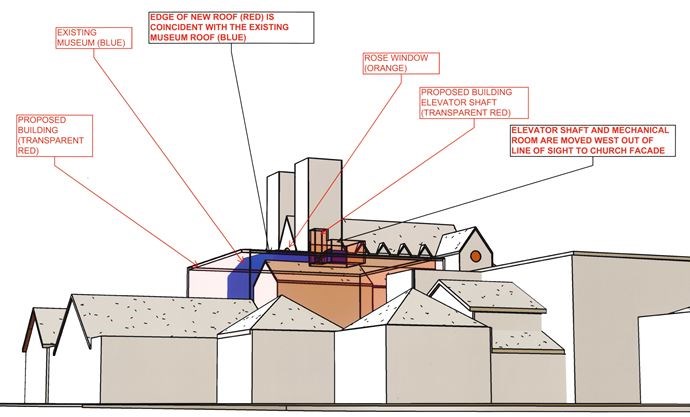The project’s fourth storey would have blocked some views of the Basilica of Our Lady Immaculate
A city committee has determined a request for a minor variance that would allow a downtown apartment building was not so minor after all.
On Thursday, the committee of adjustment voted 4-1 to reject an application for 9 and 11 Cork St. seeking to permit heights above what is allowed on that land.
The difference in height — just under three metres — would have permitted a fourth storey for the project. However, that would have also meant the building would block views of the Basilica of Our Lady Immaculate.
Brian McCulloch with James Fryett Architect Inc., speaking on behalf of the applicants, argued that the project would not obstruct the view more than it already is by the Guelph Civic Museum.
“We understand the importance of Catholic Hill to the Guelph community, and have therefore conformed to the height of the proposed building to four storeys and have basically eliminated its impact from the view corridor,” he later added.
Susan Ratcliffe, head of the Guelph-Wellington branch of Architectural Conservancy Ontario, pointed out that the museum is part of Catholic Hill, not an obstruction to it.
“That was built in the 1860s. It was the Loreto convent, and it was planned as part of a landscape with the rectory … on the other side to be a balanced view,” she said.
“It’s been there for more than 150 years.”
Ratcliffe, along with several other delegates, questioned why the application never appeared before the Heritage Guelph committee, given its potential impact on one of Guelph’s most notable landmarks.
In a memo to the committee recommending the application’s approval, city staff noted that the project “does not require a heritage impact assessment and therefore the review of this variance is not within the mandate of Heritage Guelph.”
“In the 10 years I sat on Heritage Guelph, we dealt with matters like fences, porches, backyards,” Ratcliffe said.
“We were always consulted on any issue that affected a heritage property in the city of Guelph.”
Brian Skerrett, who sits on Heritage Guelph, said he was not aware of the application until it first appeared before the committee of adjustment in June. At that time, the application had been deferred in part to get Heritage Guelph’s feedback. The issue did not appear on the committee’s next agenda.
“Calling the impact on the protected view corridors a minor variance worried me, not simply because it was possibly inaccurate,” he said.
“But because it meant that a decision that would have profound and protracted consequences for the city was being made with minimal notice, minimal input, and minimal scrutiny.”

